- Home
- Ninie Hammon
Red Web Page 8
Red Web Read online
Page 8
Then it was dark again and there was nowhere she could go that there weren't puddles of water and she was cold and shivering.
This morning, the warrior came out of nowhere and attacked the wasps, killed them! She watched him, the mighty Shannuck, her protector. He kept her safe from the wasps and made them pay for trying to sting Katydid.
But as the day gets hotter and hotter, the smell gets worse. Worse than it has ever been. It is so horrible now she only takes little breaths but that doesn't help and she gags and vomits up nothing — again and again until her stomach and head hurt. Nothing smells this bad. Nothing in all of life or the world or the planet or the universe smells this bad.
She can't stand the stink! But there's nothing she can do to escape it.
Then she remembers the day Mommy was in her bathroom blowing her hair dry and suddenly the electricity in the bathroom and in her bedroom went out and the lights went out. Katydid was playing a video game and the screen suddenly went black.
She went out into the hallway. Mommy had gone to the top of the stairs and called down to Daddy, who was watching a football game in the den.
"Blew a breaker again. Would you go throw the switch? I'm not dressed."
"What's a breaker?" she'd asked.
"Go with Daddy. Get him to show you."
She went downstairs and saw Daddy open the door to the garage.
"What's a breaker?" she'd asked him, but he was mad that he had to leave the football game and not in a mood to explain.
He had opened a gray metal door on the wall and said, "This is a breaker." Beneath the door were two rows of switches. Some of them had pieces of paper taped beside them with words written there. Daddy reached up to the first switch and flipped it off. She was standing in the kitchen and when he flipped the switch, everything in the kitchen went dark, the lights under the cabinets, the clock on the microwave and the one on the coffeemaker and all the bulbs in the chandelier over the dining room table she could see through the archway. The refrigerator stopped humming and fell silent and the fan on the ceiling spun slower and slower.
Daddy flipped another switch and the lights in the utility room on the other side of the kitchen went off.
She realized that every time he flipped a switch, a room somewhere in the house would go dark.
Snap. Snap. Snap.
With every snap, things stopped running. Then the lights in the garage went out and everything was black for a moment before Daddy started flipping the switches back on. When he flipped the first switch, the breaker, everything came back on in the kitchen, except instead of numbers on the clocks on the microwave and the coffeemaker there were just blinking green zeros.
The darkness hadn't lasted long, but for as long as it did last, nothing changed. Everything had remained exactly like it was before the lights went out.
The little girl wonders if maybe people are like that, too. Maybe they have a breaker box with switches. She goes looking for it, inside her head, searching for a way to turn off the world that is all wrong now and smells bad and wasps come and sting.
And she finds it.
She finds a way to make it all go away — just like Daddy did.
She flicks a breaker.
Now she can smell. Flick. Now she can't smell.
She is cheered by her discovery, by the power it gives her. Now that she has discovered the breaker box, the switches she can turn off inside to make the awful go away, she starts flipping them one after the other, flips all the switches and plunges her mind and soul into darkness.
It is dark now and peaceful. She puts her thumb in her mouth and curls her finger around her nose. No more scared. No more stink.
She'll hide here in this place where no light, not even a crack of it, comes. She is safe here.
Holding tight the birthday present she found among the camping supplies, in the box that had been wrapped in shiny white paper and a pink ribbon, she makes herself two promises — that she will keep the present always. And that she will never flip the switches back on. Never see the light again. Never.
Chapter Twelve
Bailey gasped and jerked upright, for a moment was totally disoriented, had no idea where she was … and wasn't quite sure who she was.
She looked around, trying to get her bearings, trying—
Then she was nauseous, so nauseous she wordlessly leapt to her feet, looked around frantically — where was she? A school, a classroom, that little boy's classroom, and she bolted for the door, threw it open and barely made it across the hall to the girls' restroom before she was violently sick. She vomited again and again, then dry-heaved until she was so weak she sank down onto the tile floor that smelled of Pine-Sol and leaned her head back against the wall of the toilet stall, panting, tears running down her cheeks.
"Bailey, are you alright?" Brice called from the door.
"No!" She took a breath. "Yes, I'm okay, give me a minute."
She got slowly to her feet and staggered to the sink where she turned on the tap and splashed cold water into her face. She felt the nausea return, but swallowed it back down. She ripped off a paper towel and slowly dried her hands, looking at her own pale reflection in the mirror and thought she looked as dead as the child in the portrait she had painted.
The little girl. Katydid. Oh, that poor child!
Bailey went out into the hallway where Brice was waiting for her and the images struck her again so powerfully she was momentarily weak-kneed. When she staggered, he swept her off her feet up into his arms, carried her as if she weighed no more than a small child down the hall to the principal's office and laid her on the couch in the waiting area, ignoring her pleas to "put me down" and her protestations that "I'm fine."
She sat up immediately. Lying on a couch made her feel like she must be in a shrink's office. She asked Brice if he'd get her a drink of water and he returned in a couple of minutes with a coffee mug emblazoned with the words "If you can read this, thank a teacher" that he had obviously swiped out of the teacher's lounge or off some teacher's desk.
While he was gone, she concentrated on breathing in and out slowly, not hyperventilating. But every time the images returned to her mind, she began to pant, gasp in horror and revulsion.
That poor little girl!
Brice pulled one of the waiting area chairs over to the couch and sat down in it.
"Are you all right now?"
"It was … oh, Brice, I can't tell you …" She lost her words, looked at him helplessly, unable to speak.
He got up from the chair and sat down beside her, putting his arm around her shoulders. Then she found herself crying. She turned to him and burst into great wrenching sobs that went on and on until her throat felt raw and her chest ached.
When the sobs ratcheted down into sniffles, she was embarrassed that she was doing that thing little kids did after they'd been crying, the hiccupping-breath thing.
She remained in his arms for a time, though, grateful for the feel of them around her. Grateful that he was there and that she felt safe, profoundly safe, maybe for the first time since she'd hidden under a dumpster with the rats.
Finally, she pulled back and sat up. He handed her a tissue, which she used to wipe the tears off her face. She took in a deep, shaky breath, drank a swallow of the water out of some teacher's cup and discovered that her hands were trembling slightly.
"Brice, it was so horrible for that little girl. I can hardly describe it."
He reached out and took her hand in his.
"Little girl?"
It was only then that the realization made it through the horror to the higher centers of her brain. She had come here to connect to Riley Campbell, just as she had painted that portrait in an effort to connect to him. But she had painted a portrait of a little girl instead of Riley, and now, sitting in his chair, she had connected not to Riley Campbell, but to the mysterious little girl again. Why?
"What did you see?"
Brice's words brought the images pounding
back into her mind, a tsunami that washed away all other thought.
"The little girl I painted, she wasn't killed in the car wreck. She survived. But her parents didn't. They were killed. And the little girl was trapped in the camper. Not just for a couple of hours. For days."
"How did she survive … food, water?"
"They were going camping so they'd packed supplies, food you could eat without having to cook it. There were empty tins all around, tuna, Vienna sausage, candy and cupcake wrappers. Chips and soft drinks."
"So she survived. How do you know her parents—?"
"She could smell them! The stench. Her parents' bodies—" Bailey couldn't say it, couldn't force the word "decay" …
"Oh, dear God."
"The stench. That's why, that's what made me sick. How bad it smelled."
She stopped, afraid she was going to be sick or start crying again.
"Katydid didn't know what the stink was. She thought her parents left her there because she'd done something bad!"
Brice patted her shoulder, urged her to take another sip of water. The motion of swallowing was calming.
"I can't imagine anything worse — drowning wasn't that horrible. She was stuck there. Alone. Afraid. Confused. It rained and everything got wet. And wasps. There was a wasp nest and they stung … that's what made the red welts on her arms and face. Wasp stings!"
She lost it again, started panting and hyperventilating.
"Breathe slowly." Brice patted her back. "In and out, slow." He rubbed her arm tenderly and she grabbed hold of her emotions.
"I didn't get this part. She said Shannuck came out of nowhere and saved her from the wasps. She imagined something, made up something, probably hallucinated some superhero savior, I don't know. I guess Shannuck was her imaginary protector."
Bailey took in a deep, shaky breath and let it out, slowly, like Brice said.
"The little girl was looking at a ribbon, a pink ribbon. That's the first thing I saw, the pink ribbon in her hand. She had just found it, her birthday present. Her parents talked about packing her present, spelled words so she wouldn't understand. She must have found the present when she was digging around for food."
She paused, gathering herself to get out the rest of the story.
"So she remembered her daddy flipping the breakers once and how everything in the house got still and quiet. And she wondered if people had breakers, too. Somehow she … Brice, this child was going insane and I was in there in her head, with her, watching her, feeling it."
Brice squeezed her hand.
"I don't know how to describe it, but she found a way to … turn things off, turn off reality. She mentally flipped a switch and she couldn't smell the … bodies anymore. Then she kept flipping switches so she couldn't see or hear or … being in her head … it just got darker and darker and darker until … nothing."
She shuddered again violently.
"That little girl … just left, checked out. I don't know how she actually died. Thirst, maybe? Starved …" A strangled sob caught in her throat and she couldn't finish the sentence.
"Back up a little. To the beginning. Tell me again what happened. You sat down at Riley's desk and then …?"
"I was suddenly inside Katydid's head and looking out her eyes. Like with Macy at the carnival, and when she was feeding Jakey. I saw what she was seeing at that moment—"
"At what moment? The little girl in the camper has been dead for — what? Almost twenty years. You couldn't have been looking out her eyes in real time like you did with Macy. So what moment in her life …?" He stopped. "Wait a minute. What was the birthday present she found?"
"I don't know. I never saw it. There were toys lying around. Maybe the present was a little doll or doll furniture. She was holding the ribbon out, looking at it, and squeezing the present in her other hand."
"Like she'd just opened it, the present?"
Bailey nodded.
"Maybe that's it, then. The birthday present."
Bailey didn't know what he was getting at.
"She got something for her birthday and you touched it, here, today, just a few minutes ago."
"I touched it. How?"
"One of the things on Riley's chair. Something there was what that little girl got for her birthday. And when you touched it—"
"I was taken into her head to the moment when she first touched it."
"Makes sense to me." Then he stopped, shook his head. "As much as any of this makes sense to me. Ever since" — he waved his hand in a sort of all-encompassing gesture — "I came charging into your house, gun drawn, when you screamed, I've been trying to apply 'sense' to something that's not logical. Reality is, we don't know jack about how any of this works."
He was right, of course. It was all—
"But if it were logical, it'd make 'sense' that you connected to that little girl because you touched her birthday present on Riley's desk."
Bailey started to rise, but Brice held her firmly by the shoulder.
"Oh, no you don't. You're not going back in there."
"But I have to. We have to know which one—"
"You are not going to touch any of those things."
"I have to figure out which one was her present, trace it to Riley. She has some connection to Riley Campbell." Her voice rose a little too high, an edge of hysteria creeping into it, but she couldn't help it.
Brice was silent for a moment. "Okay, I'll grant there must be some connection. Melody told the children to bring in something that mattered to them. Maybe a child brought in a family heirloom."
"How are we going to find out which of those items it was if you won't let me—?"
"I'll talk to the children and ask, tell Melody I need to find out where the children got the items they brought to put on Riley's desk."
"What's your excuse for wanting to know?" She tried to mimic his voice. "See, I have this friend who paints portraits of dead people who aren't dead yet and has visions of live people who've been dead for twenty years and—"
"I'll think of something. But right now …" He stood up and held out his hand to her. "I'm taking you home!"
Chapter Thirteen
"You know you don't have to bribe us with chocolate chip cookies to get us to drop by," Dobbs said, taking another cookie from the proffered plate.
"I had to come by anyway," T.J. said. "I got visitation rights with my dog — one night a week and every other weekend."
Bailey rolled her eyes.
"He's not here that often."
"I keep his picture on my mantle to help me remember what he looks like."
T.J. took a cookie, holding his hand under it as he bit in so the crumbs wouldn't fall on the floor where Sparky was snoozing contentedly at his feet. There wasn't much chocolate in a chocolate chip cookie, but it didn't take a whole lot of chocolate to make a small dog sick.
"I'm just trying to grease the wheels." Bailey put the last cookie off the sheet onto the platter and inhaled the delicious aroma. True, she had baked the cookies as a bribe for T.J. and Dobbs, but also because the smell of fresh-baked cookies was a clean, hopeful smell and she needed that after …
She hadn't completely recovered from her nausea until she'd pulled the first baking sheet out of the oven.
"Long's you keep bakin' cookies, Dobbs'll show up to eat 'em."
"You guys are a cheap date."
"Ain't free but we are reasonable." T.J. popped the last little bit of cookie into his mouth, swallowed it, and when he spoke again the bantering quality was gone from his voice. "So, what'd you paint this time?"
Of course, he knew. They both did.
"It's more than a painting this time."
T.J. rose. "Then let's go have us a look-see."
"You look, I'll make coffee. You're going to need it after you see what's in there."
When the three of them sat facing each other at Bailey's kitchen table cradling steaming cups of coffee, she began the story.
"The little boy w
ho disappeared yesterday — I tried to paint a portrait of him."
"On purpose?" T.J. was clearly surprised.
"Brice gave me the picture the boy's teacher gave him, but as you saw, that portrait in there isn't Riley Campbell."
"Who is it, then?" Dobbs asked.
"I'm hoping the two of you can help me figure that out." She took a deep breath. "It's worse than just that portrait. It's …" Even now, the memory hit her so hard she shuddered. "It's unimaginably horrible."
When she finished telling them what had happened at the school, both men sat staring at her in shocked silence. She knew exactly how they felt.
"Told you you'd need a cup of coffee."
"Coffee?" Dobbs shook his head. "I need a drink strong enough to dissolve the swizzle stick."
"That portrait can't possibly be some random child my compulsion pulled out of its bag of tricks and forced me to paint. It has something to do with Riley Campbell — it has to. Why else would I have connected to the little girl when I sat down in Riley's chair in his classroom?"
"And you want us to help you find the connection," Dobbs said.
"Would you? Please."
"Done."
They said the word in unison, then looked at each other and rolled their eyes.
"The first step is findin' out who the child is."
"Brice said that finding the record of a triple-fatality car accident wouldn't be all that difficult if it happened somewhere around here."
She turned to T.J.
"Did your mother ever paint something that happened far away … a plane crash in Montana or something like that?"
"Ain't no way to know for sure 'cause sometimes we never did find out who it was she'd painted. She'd paint somebody lying dead in the woods, a bullet hole in his chest and a couple of days later we'd hear that somebody over in Butler County got killed in a hunting accident. But lots of other times, she'd paint things and we never knew what happened. If it was somebody dead, in a couple of days she'd feel the connection snap and we knew the person had died, though we didn't know where."

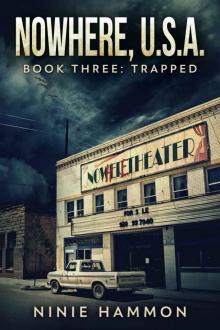 Trapped (Nowhere, USA Book 3)
Trapped (Nowhere, USA Book 3)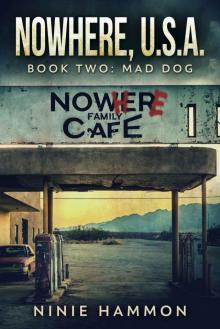 Mad Dog (Nowhere, USA Book 2)
Mad Dog (Nowhere, USA Book 2) Black Water
Black Water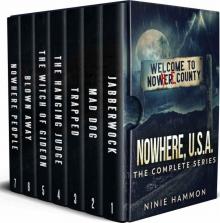 Nowhere USA: The Complete Series: A Psychological Thriller series (Nowhere, USA)
Nowhere USA: The Complete Series: A Psychological Thriller series (Nowhere, USA)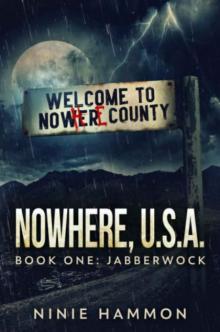 The Jabberwock
The Jabberwock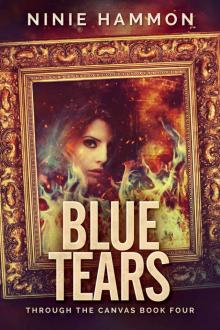 Blue Tears
Blue Tears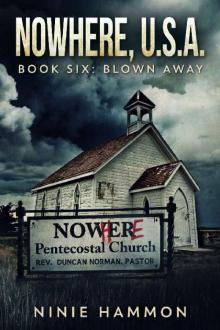 Blown Away (Nowhere, USA Book 6)
Blown Away (Nowhere, USA Book 6)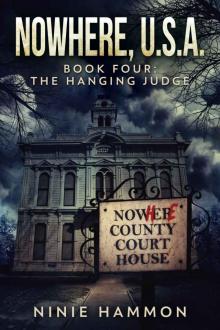 The Hanging Judge (Nowhere, USA Book 4)
The Hanging Judge (Nowhere, USA Book 4)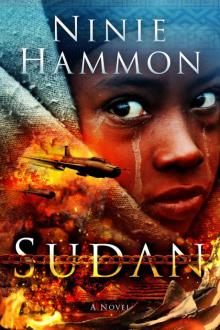 Sudan: A Novel
Sudan: A Novel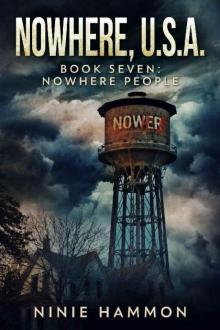 Nowhere People (Nowhere, USA Book 7)
Nowhere People (Nowhere, USA Book 7)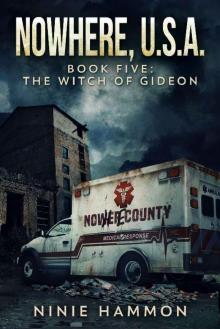 The Witch of Gideon (Nowhere, USA Book 5)
The Witch of Gideon (Nowhere, USA Book 5)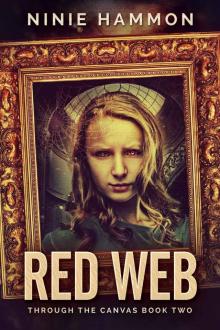 Red Web
Red Web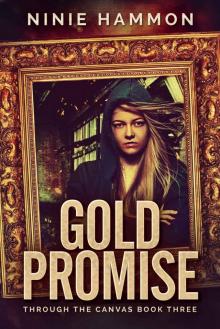 Gold Promise
Gold Promise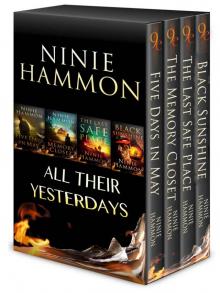 All Their Yesterdays
All Their Yesterdays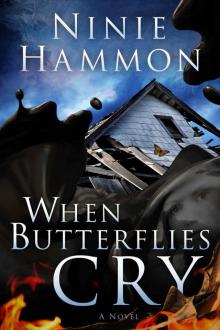 When Butterflies Cry: A Novel
When Butterflies Cry: A Novel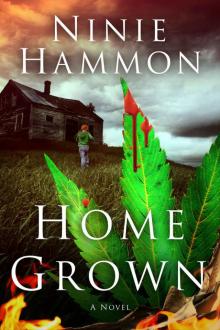 Home Grown: A Novel
Home Grown: A Novel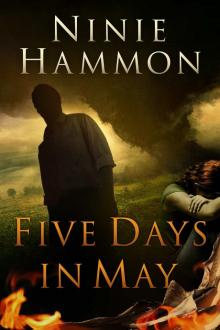 Five Days in May
Five Days in May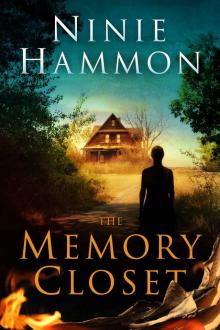 The Memory Closet
The Memory Closet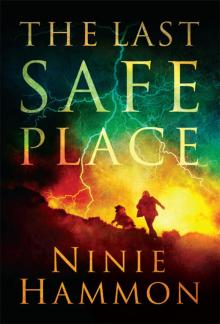 The Last Safe Place
The Last Safe Place The Knowing Box Set EXTENDED EDITION: Exclusive New Material
The Knowing Box Set EXTENDED EDITION: Exclusive New Material